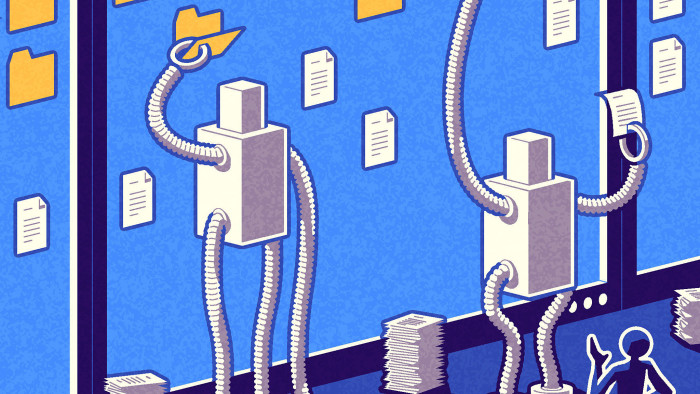Now young lawyers can sleep while the robots work
Roula Khalaf, Editor of the FT, selects her favourite stories in this weekly newsletter.

Much dreaded by junior lawyers, repapering is the task of revising contracts, a job that can involve looking at many thousands of documents.
Sleepless nights spent locked in a room with stacks of contracts are considered a rite of passage in the profession. Now, though, tech start-ups say artificial intelligence will help junior professionals avoid the tedium.
The past decade has seen a series of repapering tasks, with regulatory changes forcing companies to review various sets of documentation. The implementation of the EU’s GDPR (General Data Protection Regulation) in 2018 required organisations to revise their privacy policies.
The UK’s divorce from the EU is also set to spell big changes to legal paperwork. In 2021, the financial sector faces a deadline to disentangle its contracts from the Libor benchmark interest rate.
Armies of lawyers and paralegals used to spend hours doing this work manually. Now, start-ups equipped with software powered by artificial intelligence offer time-saving tools.
“Junior corporate lawyers spend vast amounts of time doing work they hate, that they are not that good at, that they screw up, and that clients don’t like paying for,” says Noah Waisberg, chief executive of Kira Systems.
It was while working as a lawyer that he had the idea for the start-up. He co-founded Kira with the aim of using machine learning to parse due diligence documents for mergers and acquisitions, a task he says can account for 30 to 60 per cent of a legal bill. Kira has since extended its focus to extracting data from all types of legal documents, especially contracts, using a tool that speeds up repapering by picking out the clauses to be reviewed.
In 2018, Insight Partners, the venture capital firm, paid $50m for a minority stake in the company, which counts firms such as Clifford Chance and Freshfields among its clients.
Investment in legal technology reached $1bn last year, up more than fourfold on 2017, according to research firm CB Insights. About a third of 2018’s spending was directed towards artificial intelligence.
Software company Eigen Technologies attracted £13m in its Series A fundraising in 2018, with Goldman Sachs and Singapore’s Temasek leading the round. Eigen also helps lawyers pick out the parts of a document that need to be scrutinised.
In a recent demonstration in the company’s London office, chief executive Lewis Liu entered questions such as “What is the governing law?” into the system. He then highlighted the answers in two contracts. From these examples, the system pulled and sorted relevant clauses from other documents within minutes. “We like to say that even lawyers can use it,” says Mr Liu — adding quickly: “That’s not to denigrate lawyers.”
Clients can use around 50 example contracts to teach the tool to find clauses related to Libor, privacy or EU treaties — whatever the lawyer needs to review. The ability to train the system on small amounts of data is key. It means clients can run the programs in-house, which may be essential for sensitive documents.
It is possible to run the system on small sets of data because it has already learned to recognise patterns in language. Mr Liu likens that process, called “transfer learning”, to what he sees in his young children. They learn what a car is from repeated examples; when they have a notion of “a car” in their memory they can apply that in new situations.
While a host of start-ups has won significant investment, the underlying technology is “relatively new and untested” in legal applications, says Gillian Hadfield, a professor at the Toronto university law school.
“It’s really important for lawyers to learn how this stuff works,” she says, especially as they remain professionally accountable.
Emily Foges, chief executive of Luminance, another legal start-up, says her team focuses on whether lawyers feel confident using its platform. “You, as a lawyer, need to feel you can stand behind the work,” she says.
Luminance was valued at $100m in Series B fundraising, which brought in $10m from Invoke Capital, Talis Capital and Slaughter and May, a top five London law firm that was the company’s first client. Invoke Capital’s founder, and one of Luminance’s directors, Mike Lynch, is accused of fraud in connection with the sale of software company Autonomy in 2011 — which he denies.
Overall, the increase in activity in the sector shows how far the scale of regulatory change has increased.
The case studies below showcase combining use of data and technology in business operations. They were compiled by RSG Consulting.
Case studies: AI is key to cope with documents

WINNER
Eigen Technologies
Eigen provides natural language-processing software to pull information from documents and help leading global banks meet compliance requirements. Eigen’s AI technology analyses agreements using 20 to 40 data points, ensuring that a repapering can be completed in four to five months. Eigen has reviewed millions of documents for clients engaged in repapering.
Deloitte and Kira Systems
When a new international accounting standard for leases was introduced in 2016, Deloitte had to review documents from across its US and Canada offices by January 2019. It chose AI-powered software from Kira Systems, a contract analysis specialist, to check 2,500 documents in English and French. After extracting 40 data points from each document, Kira was able to assess the number of documents Deloitte had to update to comply with the standard.
EY
EY forensics, advisory and legal departments are collaborating to help multinationals meet new regulatory requirements. The professional services company used Relativity’s e-discovery technology to build a document review tool, which was trained by EY’s lawyers. As well as providing the technology, EY offers a service to cover anything that it misses. In a recent trial for a UK investment company after rule changes on interbank offered rates, EY provided output within 24 hours, beating the competition.
Luminance
Luminance’s AI-enabled document review software is used by multinationals and governments for repapering in connection with the EU’s General Data Protection Regulation and other big contract rewrites. At one global retail bank two members of the in-house legal team completed a GDPR repapering exercise in seven days rather than the predicted nine weeks.
Leverton
Leverton, part of MRI Software, has been used by multinationals to review documents for a range of industries. After changes in international accounting standards in 2016, Leverton used AI deep-learning algorithms to sort and locate documents, analyse text and extract relevant clauses for repapering. In the past year, Leverton has been used to review 250,000 documents for various clients’ repapering requirements.

Comments